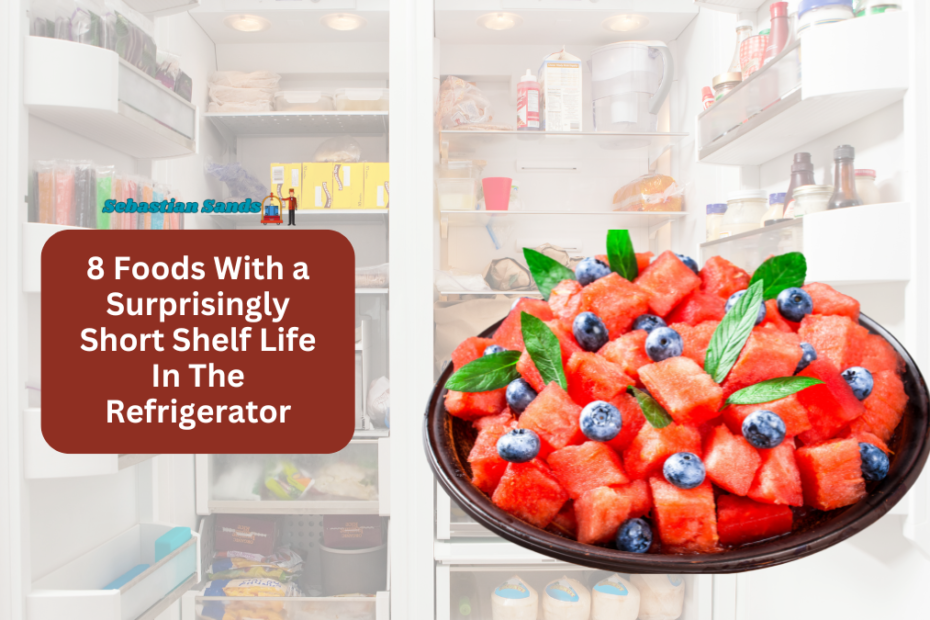Just because you store something in the refrigerator doesn’t mean it will last forever. It’s always disappointing to find out that the berries or deli meat you bought just a few days ago has already gone bad! To help you avoid this, we’ve compiled a guide on common foods that spoil faster than expected, even in the fridge.
You may be surprised by some of these items, from watermelon to hard-boiled eggs. Take note you probably have several of these in your fridge. Keep reading to learn how to keep them fresh for longer and avoid throwing out spoiled food!
1. Organic Blackberries
Organic blackberries top our list for a reason. Due to their thin skin and high water content, they are prone to bacterial growth, especially since they aren’t treated with pesticides or insecticides.
According to nutritionist Kylie Bensley, M.S., R.D., washing them with vinegar and water is best to kill residual bacteria. Storing them in a preservation bag inside the refrigerator crisper drawer can help extend their life.
2. Sliced Deli Meats
Whether turkey, ham, or roast beef, sliced deli meats have a very short shelf life. Amanda Sauceda, M.S., R.D., explains that deli meats sliced fresh at the store last only three to five days in the fridge, while pre-packaged deli meats can last up to seven days.
If you’re not planning to use them within that time frame, freezing is your best option to prevent spoilage and stay safe.
Read More : What To Eat And Drink At Halloween Horror Nights 2023 At Universal Orlando Resort
3. Cut Watermelon
When whole, watermelon can last quite a while in the fridge, but once cut, its shelf life drastically decreases. Bensley warns that cutting into watermelon speeds up water loss from the flesh, reducing its sweetness and freshness.
To preserve its flavor, keep cut watermelon pieces in an airtight container and consume them within three to five days.
4. Kale
If you’re a fan of kale, you’ll want to pay attention to how you store it. Wellness specialist Adita Lang recommends placing kale stalks in a cup of water to keep them fresh. Kale stored in a produce bag and left in the vegetable drawer will wilt within three days due to a lack of moisture.
5. Cooked Rice
According to Bensley, cooked rice should be eaten within one to two days of cooking. Although the official recommendation allows for four to six days, the bacteria Bacillus cereus, which can cause gastrointestinal illness, may survive the cooking process and multiply if the rice is left in the danger zone (40 to 140°F) for too long.
6. Lettuce
Lettuce may appear fresh, but its high water content makes it vulnerable to bacterial growth. Bensley explains that this is due to its high water activity, which encourages bacteria to thrive. Wrapping lettuce leaves in foil or storing them with paper towels can help absorb moisture and extend their life for up to 30 days.
Read More :Take Poached Eggs Beyond Breakfast With These Tasty Ideas
7. Hard-Boiled Eggs
Unlike uncooked eggs, hard-boiled eggs have a limited shelf life. They should be eaten within one week of refrigeration, especially if the shells are cracked.
Registered dietitian Kristin Kirkpatrick points out that bacteria like salmonella or listeria can thrive on the shells of hard-boiled eggs, especially if they aren’t fully cooked. Always store hard-boiled eggs at 40°F or below to reduce the risk of bacteria growth.
8. Canned Fish
Canned fish, like tuna, has a long shelf life when unopened, but it’s a different story once opened. Kirkpatrick explains that the fish is exposed to air, bacteria, and enzyme reactions that shorten its shelf life to just a few days after opening.
This also applies to other canned or jarred foods like pasta sauce, though items stored in vinegar may last longer than those stored in oil.
By monitoring these common household staples, you can minimize food waste and avoid unpleasant surprises in the fridge!
